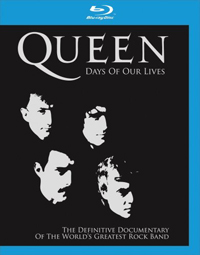They could have gone even further, but the two-decade reign of Queen with Freddie Mercury out in front was as prolific and productive as most major artists still in business today. According to guitarist Brian May and drummer Roger Taylor in the documentary Days Of Our Lives, Mercury literally recorded songs for Queen until the day before he died – perhaps the saddest revelation in this captivating two-part story of one of rock’s greatest band.
Days of Our Lives, originally broadcast on the BBC 2, is now available on both Blu-Ray Disc and DVD. Coinciding with the group’s 40th anniversary, it was produced by Queen fanatics and associates Rhys Thomas and Simon Lupton, and directed by Matt Casey. After 10 years of making Queen DVDs, Lupton and Thomas, who have been behind many of Queen’s music videos, were asked by the band to produce an authoritative 40th anniversary documentary.
The story is told through rare concert and studio footage, clips of Mercury and bassist John Deacon, plus current interviews with May, Taylor, former manager John Reid, present manager Jim Beach and various other associates and journalists.
Part one jumps right into the individual members’ musical ambitions, and before you know it, Queen is born. When asked why he came up with the Queen moniker, Mercury in an interview with Bob Harris quips, “At the time it was outrageous…” The singer, May and Taylor, formerly of Smile, and bassist John Deacon were on their way to world dominance. While the group didn’t exactly light up the charts with their first record, an appearance on Top Of The Pops, performing “Seven Seas Of Rhys” and a tour with Mott The Hoople got them noticed.
From Brian May’s health scare in 1974 to “Killer Queen” to the band being virtually broke with three albums out and a growing reputation – we get an insiders look, mostly from May and Taylor’s perspective. But the band finally broke through with their fourth album, A Night At The Opera. May and Taylor explain how the record company tried to stop the release of “Bohemian Rhapsody,” but a crafty DJ turned that all around when he played it a dozen times over a weekend. The cherry on top was the video, taking Queen to a whole other level.
More career highlights follow – a free concert in Hyde Park in 1976, A Day At The Races, the follow-up to A Night At The Opera. The single “Somebody To Love” became another hit for Queen just as critics and punks alike became outraged by the pageantry. “Anarchy against a monarchy,” is how it’s described. An encounter with Sid Vicious, described by Taylor, May and Mercury, lead to an intriguing exchange of words, but nothing more.
The band’s success, particular in America, endured through the 70s and in the early 80s. “We Will Rock You,” which May describes as a song inspired by the audience singing back to them at their concerts, “We Are the Champions,” and “Fat Bottom Girls” were all big hits for Queen.
The band’s biggest success came in 1980 when they released The Game and released the singles “Crazy Little Thing Called Love” and “Another One Bites The Dust,” which both hit Number 1 on the Billboard charts. “We were the biggest band in the world,” May says, and if you recall, he’s probably right.
The second episode focuses on the 80s and beyond, finding Queen at a crossroads with the changing times and their own personal lifestyles, Mercury in particular. A tour of Argentina and Brazil sets a treacherous tone, but their collaboration with David Bowie on “Under Pressure,” based on a John Deacon bass line, kept the momentum going.
As we learn, it was their the dance-oriented Hot Space album, the follow-up to The Game, that really hurt the band’s run in the States. Their tour behind that album would be the last they’s do in the States with Mercury. Even as they redeemed themselves somewhat with The Works and the hit “Radio Ga Ga,” they were gaining popularity in other parts of the world, not America. May acknowledges there is a whole catalog of worldwide hits virtually unknown in the U.S.
Tensions and personal turmoil lead to solo albums, largely ignored by the public. It took Live Aid to get the band back on the track and it was hailed as one of their greatest performances. The 1986 Magic tour was their biggest, hitting stadiums all over Europe. These would be the final shows with Mercury, and Taylor remembers them as being “perfect,” adding “I think he (Merecury) had an idea he might not be terribly well.”
By virtue of the fact that the singer was diagnosed HIV positive and his prognosis did not look good, a number of things happened. The group stayed off the road, became closer, decided to share all the writing credits and put their all into the studio, Mercury especially. Working n Montreux, Switzerland, they recorded The Miracle, Innuendo and music and vocals that would comprise the posthumous Made In Heaven.
It light of his sickness, the documentary reveals how the singer stayed strong. But it’s sad to see 1991 footage of Mercury. thin, frail and gaunt, singing “Days Of Our Lives.” May says he didn’t want to stop recording. “Mother Love,” would be the last song Mercury would cut. he never got a chance to sing the last verse, so May filled in.
Of course, Queen’s legacy has continued well after Mercury’s 1991 passing. Events such as the Freddie Mercury tribute concert, working with Paul Rodgers, the We Will Rock You show are all attributed to the group’s longevity. With the mauin story over, there’s an abundance of bonus footage to fill in the gaps. If you get the Blu-ray, you’ll see over an hour of deleted scenes, videos, interviews, etc, much of it as riveting as the actual documentary.
Even with all the extras, it’s a shame they couldn’t get John Deacon on board for some recent commentary. Paul Rodgers, perhaps David Bowie, and possibly other musician peers would have also added a bit more dimension to the story. But for what few flaws it has, Days Of Our Lives gives fans and bystanders alike a rare, intimate and personal glimpse of Freddie Mercury and Queen, a band for the ages.
~ Shawn Perry




















